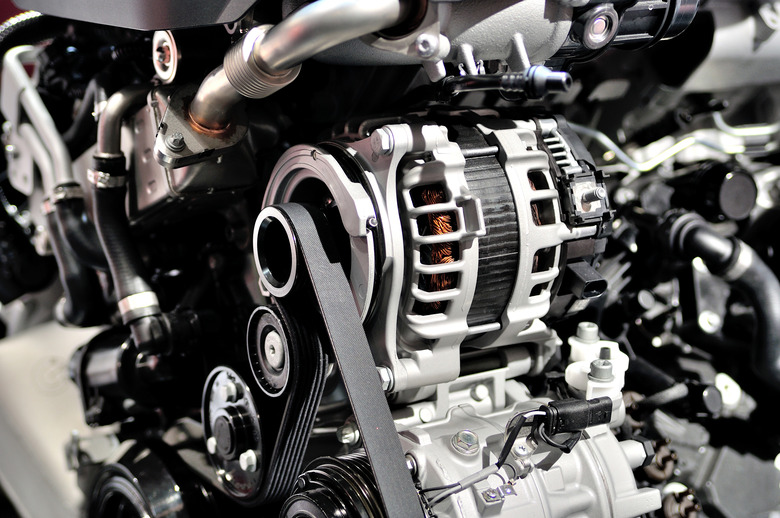DC Generator Vs. Alternator
Generators and alternators are the primary methods of producing electric power. Generators create direct current (DC) power and alternators create alternating current (AC). In the early days of automobiles, car had DC generators; these have been completely replaced by alternators in modern vehicles. Likewise, in the early days of commercial power generation, a battle ensued between the technical wizards of the day between DC and AC for dominance — a battle that AC won. But while alternators have been the big winners, generators still have their uses.
TL;DR (Too Long; Didn't Read)
Although DC generators have uses in specialized applications, the alternator's mechanical simplicity gives it an edge in vehicles and commercial electric power plants.
DC Generator Design
DC Generator Design
In terms of design, a DC generator is the simpler of the two. In fact, a DC generator can be used as a DC motor by applying power to the shaft, while the opposite is also true — turn the shaft of a DC motor, and it will act as a generator. This is one of the greatest benefits of a generator: It will produce power purely from mechanical motion. As long as you turn the shaft, the generator will produce electricity.
AC Alternator Design
AC Alternator Design
AC alternators are more complex electrically because they must convert AC to DC and this takes extra circuitry. Theoretically, an alternator can act as an AC motor, but it will not be a very good motor. However, an alternator produces a large amount of electricity and typically provides enough electricity to power all the devices on a car without taxing the battery at all.
Power Generation
Power Generation
The generator is the exact opposite of the alternator. In the generator, a winding of wires spins inside a magnetic field to create a current. In an alternator, a magnetic field is spun inside a winding of wires. Efficiency is on the alternator's side, as the wire winding is the biggest and heaviest part of both devices, so the alternator is spinning the lightest part. This means the alternator can work at a higher speed and produce more power at lower speeds.
Rings and Brushes
Rings and Brushes
Alternators tend to be more reliable than generators, largely because of the difference in how they each use rings and brushes. DC generators use split rings, which cause the brushes to wear more quickly; the brushes rub against the break in the ring. An alternator uses solid rings, which experience less wear and tear.
Stepping Up or Down
Stepping Up or Down
When you move beyond cars to commercial power generation, AC becomes the big winner. Transformers work only with AC. Because of this, a transformer can easily step up or step down the voltage from an alternator. When the voltage is stepped up, it is much easier to send it long distances over power lines with good efficiency, then step it down again for use in your home.
Cite This Article
MLA
Southern, Mike. "DC Generator Vs. Alternator" sciencing.com, https://www.sciencing.com/dc-generator-vs-alternator-6164381/. 30 April 2018.
APA
Southern, Mike. (2018, April 30). DC Generator Vs. Alternator. sciencing.com. Retrieved from https://www.sciencing.com/dc-generator-vs-alternator-6164381/
Chicago
Southern, Mike. DC Generator Vs. Alternator last modified March 24, 2022. https://www.sciencing.com/dc-generator-vs-alternator-6164381/
